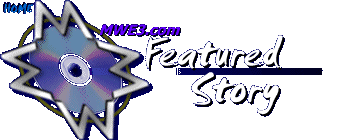IF THE
RAIN COMES
an interview with Jim Pembroke
interview written and produced by Robert Silverstein
for mwe3.com
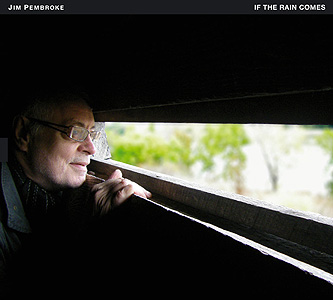 Back
in 1975, Richard Branson, or should I say Sir Richard Branson, founder
of Virgin Records, did something very unusual. Branson, together with
Virgin's original A&R genius, Simon Draper, joined forces with
Finland’s Love Records, releasing then new albums by Wigwam and
Pekka Pohjola on the then recently established U.K. based Virgin Records.
Although Pekka Pohjola had been the bassist / composer in the early
Wigwam, by 1975, the band mainly featured the music of Jim Pembroke
and group guitarist Pekka Rechardt. Having recorded in England, Finland
and Sweden, and now in his adopted homeland of America, Pembroke has
released a number of albums to his credit, solo and with Wigwam and
Blues Section, since leaving his native London in 1965 to move to
Finland. Looking back 45 years, it's safe to say that Pembroke was
a key figure at the dawn of the rock music scene in late 1960’s
Finland. Although Wigwam continued making albums in the 1990’s
and 2000’s, in fact Jim hasn’t made a solo album since 1981’s
Party Upstairs—the CD of which this writer wrote liner
notes for—so this new album is quite historical for his fans.
In a geographical twist of fate, Jim has remained a resident of Missouri
and more recently in the nearby state of Kansas for the past 20 years.
Recorded in Olathe, Kansas, the 2014 CD release of If The Rain
Comes reunites Jim with guitarist Jukka Orma, who has
played with Jim since the late 1970s and was a key component of Party
Upstairs. Also here is mid '70s period Wigwam keyboardist Pedro
Hietanen, the jazz rhythm section of Ulf Krokfors (double
bass) and Mika Kallio (drums), topped off by excellent studio
production from legendary Love Records founder / producer / arranger
Henrik Otto Donner, who tragically and unexpectedly
passed away 3 months after the recording sessions. TUM has done a
great job packaging If The Rain Comes with full lyrics, rare
pics and tribute liner notes by Jim for Otto. A legend and a veteran
of the progressive rock world, Jim Pembroke revives his legacy with
a truly inspiring 21st century rock album. www.TumRecords.com
Back
in 1975, Richard Branson, or should I say Sir Richard Branson, founder
of Virgin Records, did something very unusual. Branson, together with
Virgin's original A&R genius, Simon Draper, joined forces with
Finland’s Love Records, releasing then new albums by Wigwam and
Pekka Pohjola on the then recently established U.K. based Virgin Records.
Although Pekka Pohjola had been the bassist / composer in the early
Wigwam, by 1975, the band mainly featured the music of Jim Pembroke
and group guitarist Pekka Rechardt. Having recorded in England, Finland
and Sweden, and now in his adopted homeland of America, Pembroke has
released a number of albums to his credit, solo and with Wigwam and
Blues Section, since leaving his native London in 1965 to move to
Finland. Looking back 45 years, it's safe to say that Pembroke was
a key figure at the dawn of the rock music scene in late 1960’s
Finland. Although Wigwam continued making albums in the 1990’s
and 2000’s, in fact Jim hasn’t made a solo album since 1981’s
Party Upstairs—the CD of which this writer wrote liner
notes for—so this new album is quite historical for his fans.
In a geographical twist of fate, Jim has remained a resident of Missouri
and more recently in the nearby state of Kansas for the past 20 years.
Recorded in Olathe, Kansas, the 2014 CD release of If The Rain
Comes reunites Jim with guitarist Jukka Orma, who has
played with Jim since the late 1970s and was a key component of Party
Upstairs. Also here is mid '70s period Wigwam keyboardist Pedro
Hietanen, the jazz rhythm section of Ulf Krokfors (double
bass) and Mika Kallio (drums), topped off by excellent studio
production from legendary Love Records founder / producer / arranger
Henrik Otto Donner, who tragically and unexpectedly
passed away 3 months after the recording sessions. TUM has done a
great job packaging If The Rain Comes with full lyrics, rare
pics and tribute liner notes by Jim for Otto. A legend and a veteran
of the progressive rock world, Jim Pembroke revives his legacy with
a truly inspiring 21st century rock album. www.TumRecords.com
{The following telephone interview with Jim Pembroke took place on
September 1, 2014}
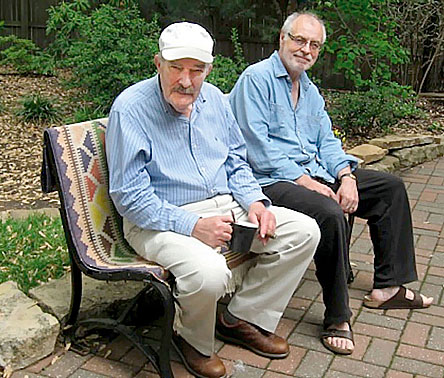 mwe3:
It’s been a while.
mwe3:
It’s been a while.
Jim Pembroke: Sure, it has yeah.
mwe3: How’s Kansas City doing?
Jim Pembroke: Oh it’s fine, Kansas City’s fine.
mwe3: How long have you been living near Kansas City?
Jim Pembroke: We moved back here with my wife Cady in the Fall
of 2007, so that’s like six or seven years ago.
mwe3: When did you first go to Kansas City? Wasn’t that
back in the early 1990’s?
Jim Pembroke: No, Kansas City the very first time would be
the fall of 1985. I’d have to look it up. On the Wigwam site
we have all the stuff. One of the times I was here, the guy who fixed
the gigs here, he said... Every time I visited Kansas City it was
like for just one night. So he said, if I could come over and spend
more time, he’d line up some local guys to play with, who knew
something about Wigwam. I came back, must have been spring of ‘95.
I’m getting my timetable all mixed up here.
mwe3: You worked with Rick Chafen back then. I remember Rick
from the Light Ages period in the early 1990s. So you’ve
been working with Rick because I saw his name on your new album.
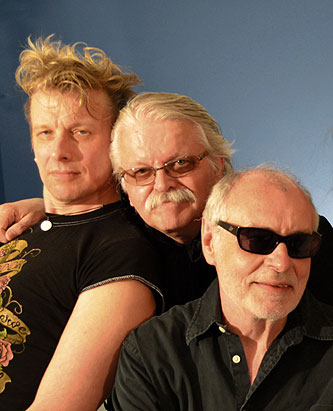 Jim
Pembroke: Yeah well when the guys came over, and he volunteered
transport. He shuttled us around from the hotels to the studios and
restaurants and stuff like that. Rick’s doing fine. I see him
every once in a while. There’s an Indian restaurant here we go
to occasionally on a Sunday afternoon.
Jim
Pembroke: Yeah well when the guys came over, and he volunteered
transport. He shuttled us around from the hotels to the studios and
restaurants and stuff like that. Rick’s doing fine. I see him
every once in a while. There’s an Indian restaurant here we go
to occasionally on a Sunday afternoon.
mwe3: So you have a green card? You aren't a US citizen yet.
Jim Pembroke: Yeah I got a green card. I forget my official
status. (lol)
mwe3: What’s the difference between here and Finland?
Do you miss Finland at all?
Jim Pembroke: Yeah, certain things you always miss. Some of
the old faces and places. But I don’t miss the weather. You know,
the summer’s so short there. It’s beautiful but short and
the winters, you’re guaranteed they’re long and harsh. Cold,
it’s cold. It’s like 2000+ miles north of Florida kind of
thing. Get into northern Canada. So in January, it’s freezing
cold.
mwe3: You haven’t been to Florida though.
Jim Pembroke: I have, yeah. I spent about two weeks in Miami.
There’s quite a few Finnish folk living north of Miami. So I
went to visit one or two guitar players who lived there at the time.
Up there about 45 minutes north of Miami. You’re in Miami now
right?
mwe3: I’m near Fort Lauderdale in Pompano Beach. Anyway,
I want to congratulate you on your new album, If The Rain Comes.
Why do you think it took so long to get another solo album out?
Jim Pembroke: Yeah, basically when Love Records folded in 1978
/ 79, Otto Donner formed a new company called Ponsi. We stayed with
Otto on that company. And we made that album Flatbroke, among
other things, but then Otto moved away from Helsinki. About
fifty miles west of Helsinki and wasn’t really active in the
record company level until he started putting together his digital
editing studio in the town of Tammisaari, where he lived. I went down
to visit him every once in a while and we always had it on the planning
board that at some time, we'd make a solo album. That was the idea.
And he said, he was planning to build a studio. That took years. In
the meantime, I was working with all these other singers and bands
doing the songwriting and lyrics. No time to make another solo album...
until now.
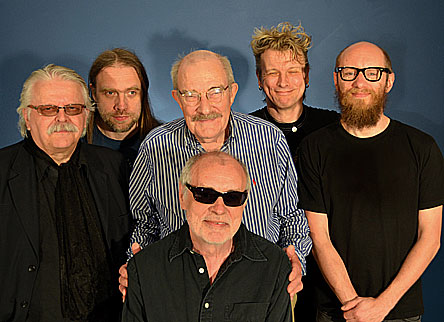 And
by the time he did call, talking about a solo album, it was like he
called me two weeks before we were coming back here in 2007. He called
me. He didn’t know I was coming back to America. He called, 'I
got the studio ready, let’s start doing the album.’ I said,
‘Otto, if you could have called a month or two earlier. I’ve
got tickets for the States now. The week after next. And he knew straight
away, that’s not going to be long enough. Two weeks is not enough
time to make a new album. So we just said, ‘Let’s see, maybe
somewhere down the line we’ll get a chance to make something
happen ’, I was saying. Eventually... we called each other every
once in a a while. Like the summer of three years ago, 2011 he called
and he said, ‘How about you coming to make an album now?’
I said, ‘Yeah, anytime it would suit you.’ I know, Otto,
in the summer he’s sailing as much as he can...
And
by the time he did call, talking about a solo album, it was like he
called me two weeks before we were coming back here in 2007. He called
me. He didn’t know I was coming back to America. He called, 'I
got the studio ready, let’s start doing the album.’ I said,
‘Otto, if you could have called a month or two earlier. I’ve
got tickets for the States now. The week after next. And he knew straight
away, that’s not going to be long enough. Two weeks is not enough
time to make a new album. So we just said, ‘Let’s see, maybe
somewhere down the line we’ll get a chance to make something
happen ’, I was saying. Eventually... we called each other every
once in a a while. Like the summer of three years ago, 2011 he called
and he said, ‘How about you coming to make an album now?’
I said, ‘Yeah, anytime it would suit you.’ I know, Otto,
in the summer he’s sailing as much as he can...
mwe3: So Cady was with you in Finland too?
Jim Pembroke: First of all, we stayed two years in England
and I was going back and forth to Finland. And in the end I said,
‘Cady, let’s move to Finland at least two years, not two
weeks, but two years to see where Wigwam wants to go this time. And
she was, ‘Yeah, let’s go.’ So we did and we got an
apartment there and before we knew it we were there five years already.
And after five years, Wigwam gradually started going to sleep again.
So I said to Cady, this was like the end of 2006, I said ‘Cady,
okay let’s start planning to move back to Kansas City.’
mwe3: Cady is from Kansas City.
Jim Pembroke: Yeah.
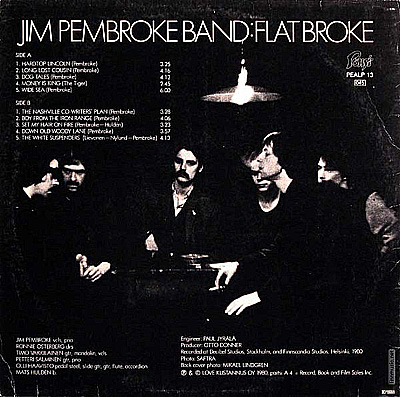 mwe3:
So you were saying, you were living in Helsinki, with Cady in 2006
and then you decided you wanted to go back to Kansas City?
mwe3:
So you were saying, you were living in Helsinki, with Cady in 2006
and then you decided you wanted to go back to Kansas City?
Jim Pembroke: Well, I’d done the USA / Finland trip backwards
and forwards quite a few times and she’d been doing the same
while we were living in Finland. Going back every year at least once.
And I could feel it was about time. She was getting a bit homesick
and Wigwam was showing signs of dozing off again.
mwe3: This was after the Some
Several Moons album in 2005.
Jim Pembroke: Yes, after.
mwe3: So you went back and then just before you came back in
2007 Otto called you to make a record and you couldn’t do it
because you were going back to the US?
Jim Pembroke: Yeah.
mwe3: I’m glad you came back. I remember speaking to you
a few times over the years. I think your new album If The Rain
Comes is your best album yet. Every song on it, has your stamp
all over it.
Jim Pembroke: Well we started talking about it with Otto in the
summer of 2011. And I said, “When’s a good time when you
might have a few weeks free?” He being such a busy guy. I figured
I’d go there maybe four to six weeks at the end of October 2011.
So I turned up in Helsinki in October 2011 and made my way to his
place, down along the coast, about fifty miles west of Helsinki. Beautiful
place. And when I got there he says, “Let’s go to Tavastia”.
That’s the main rock club in Helsinki. As I just arrived from
Kansas City, via Helsinki, I said, “Otto, I’m kind of jet
lagged out here... I’ll have to give it a miss this time an'
get some rest.” So Otto went to Tavastia. And he’d come
back and said, ‘I bumped into Pedro and Orma and told them how
you were here thinking of putting the record together and they want
to come along.’ He said they were both yes!
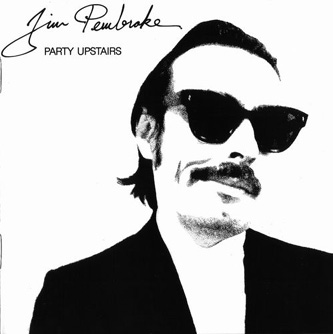 But
before that, I need to say that I had the idea before that the bass
would be a double bass. And I knew the guy, who I wanted. Ulf Krokfors.
He’s a great jazz player and one of Otto’s old students.
He would take students every so often who seemed to have some promise
(lol). And Uffe was one of them. So I knew that Ulf had over the years
worked with Otto’s band and on a lot of records with Otto. So
Otto was very welcoming about that idea. So I checked out, who’s
Uffe played with and the first name that comes up is is Mika Kallio,
who I’d never met. I’d never played with Ulf or with Mika,
the drummer. I said to Otto, how about Mika Kallio, do you know much
about Mika? And he said ‘they don’t come any better than
Mika.’ So I said how about Ulf and Mika then? There’s our
bass and drums. Otto says, ‘that’s good.’
But
before that, I need to say that I had the idea before that the bass
would be a double bass. And I knew the guy, who I wanted. Ulf Krokfors.
He’s a great jazz player and one of Otto’s old students.
He would take students every so often who seemed to have some promise
(lol). And Uffe was one of them. So I knew that Ulf had over the years
worked with Otto’s band and on a lot of records with Otto. So
Otto was very welcoming about that idea. So I checked out, who’s
Uffe played with and the first name that comes up is is Mika Kallio,
who I’d never met. I’d never played with Ulf or with Mika,
the drummer. I said to Otto, how about Mika Kallio, do you know much
about Mika? And he said ‘they don’t come any better than
Mika.’ So I said how about Ulf and Mika then? There’s our
bass and drums. Otto says, ‘that’s good.’
Then he goes to Tavastia and comes back with Pedro and Orma. Not literally.
He came back with news that they would be gladly onboard. So there
we had the band. As far as guitarists and other keyboard players,
I had so many names, that I kind of figured I’d wait and hold
my cards close to my chest and see what Otto came up with for a guitarist.
I figured none of the Wigwam guys y’know? To have a totally unique
lineup in the band. Guys I hadn’t played with before. Well Pedro,
is ex-Wigwam. It had been so many years that Pedro was fine and Orma...
well Party Upstairs was me and Orma pretty much, but they'd
never played together as a group.
But then, okay so I was in Finland. And it didn’t take long,
a day or two, to realize these guys were so booked up. Gigs all over
the place. It was kinda like, well Pedro can come in like two weeks
time for an afternoon. And then Orma, well he can come next month
because he’s touring now. And all the guys are booked to hell,
y’know? So it didn’t take me long to figure out... I wasn’t
prepared to stay until the new year. We’re still in October here
and Otto was already talking about, ‘oh well, this is going to
take half the new year.’ And I said, after thinking about it
a while, ‘Otto, I don’t want to be hanging around here for
2, 3, 4 months. It’s not the right time obviously.’ The
guys that want to play on the thing, we haven’t got a chance
of getting them all in the same room at the same time. So I just came
out with it to Otto and said, ‘I think I’ll have to go back
to Kansas City and we’ll have to maybe look at it some other
time.’
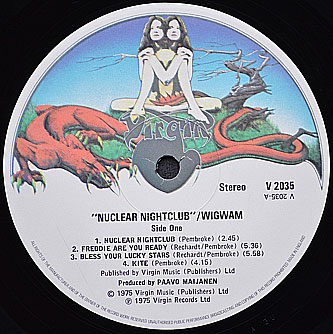 Then,
at some point, Otto said, ‘Next year, 2012’. In May, he
was going to New York to pick up a boat from Newport Rhode Island
and sail it back across the Atlantic. All right? So I said, ‘Otto,
why don’t you come a couple of weeks, or more before you pick
up your boat? Just come to Kansas City and we’ll go to Charlie
Parker’s grave. We’ll do the 18th & Vine, all the clubs.’
I played in all the clubs along there... I said to him. And he was
like, ‘Yeah, yeah...’ And it didn’t take him long to
come up with a plan. And the plan was to somehow get these four guys
all into the same airplane and fly them to Kansas City. (lol) Which
is what happened...in April 2012, after everybody had the time to
clear their calendars of outstanding gigs.
Then,
at some point, Otto said, ‘Next year, 2012’. In May, he
was going to New York to pick up a boat from Newport Rhode Island
and sail it back across the Atlantic. All right? So I said, ‘Otto,
why don’t you come a couple of weeks, or more before you pick
up your boat? Just come to Kansas City and we’ll go to Charlie
Parker’s grave. We’ll do the 18th & Vine, all the clubs.’
I played in all the clubs along there... I said to him. And he was
like, ‘Yeah, yeah...’ And it didn’t take him long to
come up with a plan. And the plan was to somehow get these four guys
all into the same airplane and fly them to Kansas City. (lol) Which
is what happened...in April 2012, after everybody had the time to
clear their calendars of outstanding gigs.
Then Otto asked, ‘Do you know any good studios?’ I said,
‘yeah sure I know the guy who owns this studio’, which at
the time was the only one in the Midwest that’s built from the
floor up to the roof as a studio. Most studios are converted warehouses
or what ever. This one was built from the ground up as a studio. I’d
been in there making a few demos. The guy, Lynn Allred said one time
if I got a bigger project down the road, come to him and he’ll
throw me a deal. So I said that to Otto. And I called Lynn and he
said yeah. So we booked a hundred hours. We didn’t need a hundred
hours. It might sound like a lot but when you divide it up to six,
eight hours a session, a hundred hours gets used quick. But these
guys... I’ve still got a good few hours left there, I could use
anytime.
But anyway, somehow this got all the guys together. We needed everybody
to have no gigs so they could all come here for ten days at least.
We figured in ten days we could get the thing done, which we did.
Except for the vocals. This would have come out like two years ago
if everything had gone to plan. But hardly anything went to plan,
except the songs. I had the songs ready. But everything else was kind
of like, ‘what’s happened?’ But once the guys were
here, it started happening really quick. I told Lynn have the tapes
ready to roll because these guys are real fast on the uptake. They
don’t need to rehearse a song more than once or twice. We need
the tapes ready to roll.
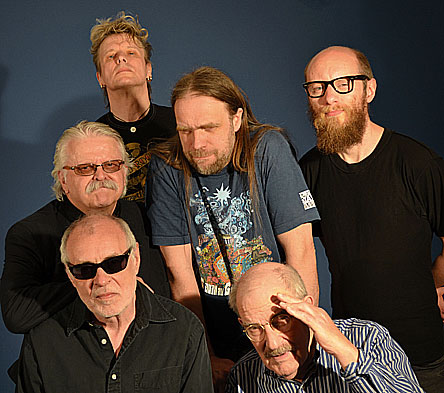
mwe3: So Jukka and Pedro, they must have already heard the
songs.
Jim Pembroke: They had no idea. Not one note. But they’re
top rate pro musicians, y’know?
mwe3: They must have esp with you by now.
Jim Pembroke: Well, I don’t know. I think maybe they knew
how Wigwam worked. You just sit down, turn on, you start playing.
And you just play. If you can’t play then you won’t need
to be there. So we only got guys who, (shouts out) ‘All right
it’s time to play guys, let’s try this’, and I start
playing something, sing something. And they’ll start playing.
There’s no BS, what key... I had written out chord charts for
them with the basic structures of the songs.
mwe3: Everybody was there? Otto was there in Kansas City.
Jim Pembroke: Yes. Everybody. Otto came earlier, to stay at
our house. He came a couple of weeks earlier just like we thought.
But he dreamed up the plan of making it possible to get these four
guys, to get them here. And everything worked out. A miracle.
mwe3: So the album was recorded in 2012 when they came over
to the States, and then Otto took the tapes back to Finland and Otto
did his string work and that kind of stuff?
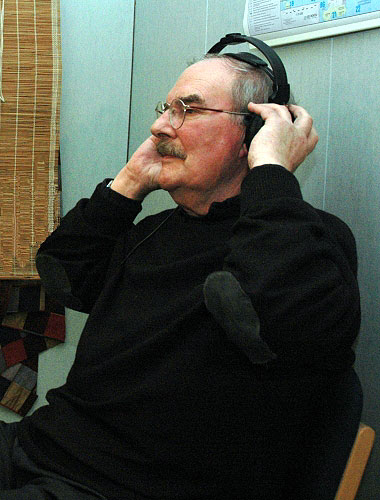 Jim
Pembroke: Well what happened is, Otto decided he’d come back
in the Fall of 2012, when we had worked on the backing tracks with
the strings and stuff, and then we’d do the vocals in the Fall.
He’d come back and I'd redo some piano. So I said yeah, fine
okay. Then he goes to get his boat from Rhode Island right? Then,
on the boat, he fell on his back. He fell on his back, he hurt his
back. Cracked vertebrae. He was 73 years old and really didn't need
that. He hurt his back bad and goes back to Finland, sailing across
the Atlantic for six weeks with a broken back. It’s a long, horrible
story. It was obvious that he wasn’t going to be able to make
it in October 2012 to do the vocals. And I said, ‘don’t
worry about it Otto.’ The doctor said he can’t travel. I
said take as long as you like. We don’t want you working in pain
anyway. He would have worked with pain but I said, ‘Don’t
worry about it Otto, come back when you’re feeling up to it.’
Jim
Pembroke: Well what happened is, Otto decided he’d come back
in the Fall of 2012, when we had worked on the backing tracks with
the strings and stuff, and then we’d do the vocals in the Fall.
He’d come back and I'd redo some piano. So I said yeah, fine
okay. Then he goes to get his boat from Rhode Island right? Then,
on the boat, he fell on his back. He fell on his back, he hurt his
back. Cracked vertebrae. He was 73 years old and really didn't need
that. He hurt his back bad and goes back to Finland, sailing across
the Atlantic for six weeks with a broken back. It’s a long, horrible
story. It was obvious that he wasn’t going to be able to make
it in October 2012 to do the vocals. And I said, ‘don’t
worry about it Otto.’ The doctor said he can’t travel. I
said take as long as you like. We don’t want you working in pain
anyway. He would have worked with pain but I said, ‘Don’t
worry about it Otto, come back when you’re feeling up to it.’
So okay, then we need to fast forward to 2013, one year after the
backing tracks were done. Then he was healthy enough to come back
to do the vocals. And Uffe came with him. The bass player. And I had
this new tune “Midnight At Abbey Road”. Originally, I told
Otto, ‘I’ve got a new song, I can’t get it out of my
head, let’s try it.’ He said, ‘Yeah, yeah okay’.
And Ulf was with him. Ulf heard it and says ‘Where’s the
bass, I wanna play bass.’ So that’s what we did. This was
spring 2013. So we did the vocals and piano bits, then he took the
tapes back over the summer to write the strings and we decided there’s
a couple of places for some saxophones. And he had the right guy to
play. Manuel, a great young sax player. And he said ‘I’ll
take care of them.’ And Pedro put some extra accordion and he
said everything’s going good.
Then we get the news, the phone rings one morning here and it’s
Pedro and it’s like the end of June of last summer - 2013. He
says, 'Jim. Bad news. Otto died last night.’ He had another accident
on the boat he bought in Newport Rhode Island. He somehow slipped
and fell in and there was nobody around and he banged his head on
the way down. They said he didn’t know a thing about it. They
found him the next morning next to the boat. The first thing I thought
was ‘What was Otto doing alone on the boat at night.’ He
wasn’t doing anything that he hadn’t been doing a thousand
times before. You know, tinkering around on a boat. That’s what
he liked doing most, besides composing music. But I noticed the first
time he was here that his balance wasn’t too good. If he turned
around to answer you, or say something, he could easily kind of lose
his balance. And he said he had a mild Parkinson's coming on. And
he’d take these prescription drugs and it affected his balance.
If he’d turn suddenly he could like kind of rock back on his
heels. So I’m thinking that’s just what happened. He just
lost his balance and he shouldn’t have been there by himself.
But Otto could be very stubborn as well. (lol) Tell him, ‘you
can’t do that,’ that’s the first thing he did.
 mwe3:
This was in Finland when Otto died?
mwe3:
This was in Finland when Otto died?
Jim Pembroke: Finland, yes...
mwe3: He drove the boat across the Atlantic Ocean or he flew
it back?
Jim Pembroke: He sailed it across the ocean. Yup.
mwe3: It must have been a big boat... (lol)
Jim Pembroke: It wasn’t gigantic but it was big enough.
75 feet or something like that. He had a crew of like ten or twelve
guys with him. It wasn’t like, ‘Well, I'll see you then’...
and he goes off alone. No. He had a professional crew to sail over
the Atlantic.
mwe3: So Otto had already done the string arrangements. When
he died, everything was kind of completed right?
Jim Pembroke: Yeah, yeah. And I don’t know how far he’d
gotten with the mixing but he’d gone on to the mixing part of
it. Maybe half way, but he died before the mixing was through. So
you know, things like that... it’s been a three year process,
to this day. This record is one and a half to two years behind when
we originally thought it might be ready for release. It could have
been ready for spring 2013 if we didn’t have all these accidents
and mishaps and all that no good stuff.
mwe3: For those who don’t know who he is or was, Otto
was one of the great music producers of the rock era from Finland
and all of Europe. Could you tell us how you met Otto in the first
place. Was he involved with your early bands like Blues Section and
was he involved in the creation of Wigwam? How far back do you go
with Otto?
Jim Pembroke: We go back to like 1967 when Love Records started.
Otto said to Mosse (Groundstroem), ‘Make a band and have you
in it and Jim’s songs. Make a band and we’ll make a record.’
So, that’s what we did. We called it Blues Section and after
we made the record it was a big success. I first actually, physically
met Otto earlier in ‘66, I think it must have been. I was doing
some TV show in Helsinki and he was up there in the recording and
sound room. That’s where I first met him. I didn’t know
his name or anything like that but he gave me a magazine. I wonder,
‘what’s this?’ And it was Hustler magazine. (lol) So
I thought, ‘who’s this character?’ (lol) So later I
went down to the cafe in the TV studio, where all the people are.’
So I saw him sitting over there and I went and said, ‘thanks
for lending the magazine.’ I think he meant that I should keep
it and he was like ‘okay, okay.’ And that was it. I didn’t
talk to him or anything. And the next thing I know, he’s setting
up Love Records and wanted to go with a new band, and with songs of
mine. That’s pretty much what we did. Since then, Blues Section
morphed into Wigwam and Otto was always there behind the recording,
behind the glass between the studio and the control room on all of
those first records.
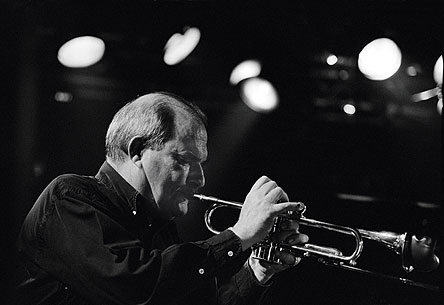 mwe3:
It’s like the end of an era. It must have been a jolt, I mean
after Otto had done the record with you. Sorry to see it go that way.
Otto was a great man.
mwe3:
It’s like the end of an era. It must have been a jolt, I mean
after Otto had done the record with you. Sorry to see it go that way.
Otto was a great man.
Jim Pembroke: Oh man. It’s just like, what the hell? Just
a bad luck sign. Something like that. The funny thing is, I’ve
done quite a few of these interviews now with the Finnish press, the
last couple of weeks and one of them I read made quite an insightful
remark saying that, in a way that, this new record is echoing all
the way back to Blues Section because we had the same lineup. We had
the saxophone in Blues Section too and on this new one we have it
too and the rest of it’s pretty regular guitar, bass, drums and
keyboards. Blues Section wasn’t keyboards in the beginning, although
I played a bit of keyboards. You know I make songs on keyboards as
well as guitar. I had no interest in being a pianist and learning
everything. Well I did in the end. In Blues Section’s time I
was just the singer and that suited me fine. Songs I could show them
on piano and guitar. I didn’t need to play them on stage. At
the time, I’d get real players for that. (lol)
mwe3: Obviously you know that Pekka Pohjola died near the end
of 2008. That was a huge shock to me. Did you hear it right away?
Jim Pembroke: It was ‘08 when Pekka died right? Yeah,
well some time earlier in 2007, the phone rang in my apartment, and
it’s Pekka. And he says, ‘Hey Jim! How's about I come over
for a visit?’ I said, ‘Pekka! Yeah, sure.’ I hadn’t
seem him for years y’know? Well he turned up and he stayed a
couple of nights.
mwe3: This was in ‘07?
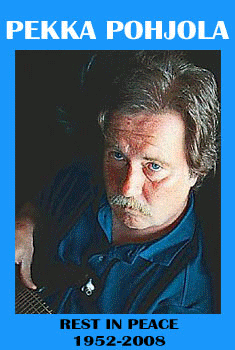 Jim
Pembroke: Yeah. He was sitting around drinking a cold beer and
just having a good time. And then he would say, ‘I can think
of a song’, so I said what chords do you want? He'd say, ‘E
flat major 7’. You know, I’d play the chords. He said ‘Now
A flat.’ You know things like that. So I did. I hadn’t seen
Pekka for like some years, before this telephone call but through
the grapevine, you hear different things about different people and
what we were hearing about Pekka wasn’t good. He knew he had
to get away from this alcohol disease and... he couldn’t beat
it, looks like. There was a lot of people sad and worried about him
but there didn’t seem to be anybody who knew what to do about
it. Friends would take him out to golf, play tennis. He loved to play
tennis a bit. But he always ended up back at the bar, perched behind
a drink. Poor Pekka. We had a lot of good times after he first joinied
Wigwam.
Jim
Pembroke: Yeah. He was sitting around drinking a cold beer and
just having a good time. And then he would say, ‘I can think
of a song’, so I said what chords do you want? He'd say, ‘E
flat major 7’. You know, I’d play the chords. He said ‘Now
A flat.’ You know things like that. So I did. I hadn’t seen
Pekka for like some years, before this telephone call but through
the grapevine, you hear different things about different people and
what we were hearing about Pekka wasn’t good. He knew he had
to get away from this alcohol disease and... he couldn’t beat
it, looks like. There was a lot of people sad and worried about him
but there didn’t seem to be anybody who knew what to do about
it. Friends would take him out to golf, play tennis. He loved to play
tennis a bit. But he always ended up back at the bar, perched behind
a drink. Poor Pekka. We had a lot of good times after he first joinied
Wigwam.
mwe3: Do you remember how you met Pekka Pohjola in the first
place? Because he joined Wigwam after Mats left. Pekka sort of entered
the picture in Wigwam in 1970? What did you think about him when you
first met him?
Jim Pembroke: First time, I think it must have been... 1969,
and we had to check out this new young bass player guy. So they were
playing some place one night and we were there with Ronnie and the
rest of the guys. And this band comes on, Jussi & The Boys actually.
One of the first bands I ever sang with in Finland, but that’s
another story. Pekka was the bass player for that band. And he came
on and just played up a storm y’know? So straight after we were
like ‘hey, you guy, come to this band.’ And he said ‘all
right.’ Picked his bass and amp up and put it in our wagon (lol)
and became a Wigwam-er at that moment. He knew that Gutsi, you know
Jukka Gustavson, was already in Wigwam and Mats had to leave for studying
for the usual thing... In Finland, it’s either graduation studies
or the army that broke many bands up. But Pekka joined and it didn’t
take long for Jukka and the other guys to really get steaming, with
what became Fairyport really. Well Tombstone Valentine was
our first effort...
mwe3: That was when Pekka wrote that song “1936 Lost In
The Snow” which was such a beautiful song considering it was
the first thing he recorded with Wigwam.
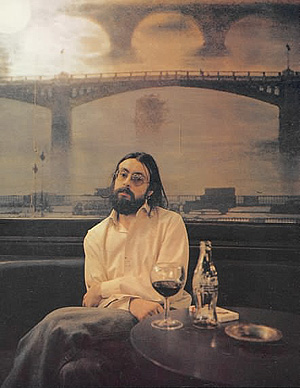 Jim
Pembroke: That was off of Tombstone Valentine and maybe
you remember that Kim Fowley was part of that. Kim Fowley produced
that. Is Kim Fowley a familiar name?
Jim
Pembroke: That was off of Tombstone Valentine and maybe
you remember that Kim Fowley was part of that. Kim Fowley produced
that. Is Kim Fowley a familiar name?
mwe3: I just spoke to him a couple years back about you. I
gave him your email...
Jim Pembroke: I exchanged a couple of emails with him.
mwe3: I spoke to him about you back when I lived in L.A. in
1975. The story is that Kim Fowley knew Zappa and for anyone who doesn’t
know it, Zappa had asked Pekka Pohjola to join his band right?
Jim Pembroke: I was sitting at the table in Helsinki where
Zappa was making sounds for Pekka to join. He said ‘I’ll
pay your airfare’, and all that.
mwe3: So you heard Zappa say that right?
Jim Pembroke: Yeah. But this was way before Pekka had any problems
like alcohol and that... this was like 1972 or ‘73...
mwe3: I still think about Pekka and pray for him. Speaking
of something else, how’s your daughter Emma? I met her nearly
30 years ago. She’s mentioned in the new album liner notes.
Jim Pembroke: Yeah, she’s fine. Works with horses. An
equestrian. Has a lot to do with that now. She visited here three
or four summers ago.
mwe3: There’s so much to talk about with your new 2014
CD, If The Rain Comes. You use some word play / imagery from
the Beatles’ “Rain” song and sort of use it as a kind
of cosmic flashback or even a John Lennon tribute 33 years later.
Jim Pembroke: Yeah. The funny thing is that all those songs
are new except for one... maybe you can guess which one it is? It’s
“If The Rain Comes”. That one, I literally made after I
saw... I was in Bournemouth on the afternoon of September the 11th,
2001. That was tuesday afternoon. And after I saw the second plane
hit the World Trade Center, realizing oh no, this was not an accident,
then I wrote “If The Rain Comes”. That song has been under
my pillow for like... 13 years?
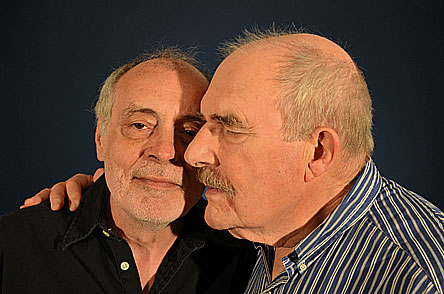 mwe3:
Where were you, in Bournemouth?
mwe3:
Where were you, in Bournemouth?
Jim Pembroke: Bournemouth, in England. 2001. I’d been
living there already a year, in Bournemouth, over a year. I’ve
got the cassette tape of the date on it and everything. 9/11/01. “If
The Rain Comes”. And that song has just been in the bottom of
my drawer. But I’ve always had it in the back of my mind, then
I’ll save it for when I get a chance to make a record with Otto
and the song is there. Otherwise, the rest of the stuff was made in
the last couple of years. Two and a half to three years.
mwe3: And If The Rain Comes closes with “Midnight
In Abbey Road”, which ironically is the newest song. So that’s
another Beatles tribute kind of song. That’s kind of an eerie
song.
Jim Pembroke: And I didn’t mention The Beatles at all
in the song. I thought, one thing I’m not going to go is to mention
any Beatles in that song. It’s just a song about Abbey Road at
midnight.
mwe3: You grew up in London, so how amazing is that? Did you
grow up near Abbey Road?
Jim Pembroke: Well Abbey Road is about four miles from where
lived. In North Finchley.
mwe3: You must have thought, wow the Beatles were just in Abbey
Road recording songs for Rubber Soul or something like that...
(lol)
Jim Pembroke: Well I was already in Finland by that time, y’know?
I went to Finland in 1965.
mwe3: There’s so much interesting wordplay in that song
since Abbey Road is now associated with that song.
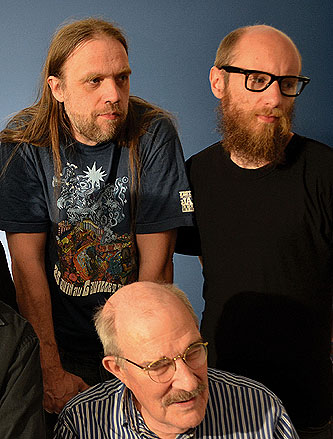 Jim
Pembroke: You see, we go back to Otto’s back again. You see
because he’d hurt it and couldn't come back in October of 2012,
I had this extra time. And I started... well I was writing lyrics
and stuff. I had the tapes, the backing tapes that we’ve made
with the guys, with no vocals. So I was working on finishing up lyrics
and stuff. And just for fun, I started making this song. And it only
occurred to me to make that song because, it sounds funny (lol) but
it’s the web cam? Do you know the web cams that are all over
the world today? I said, ‘well there’s a web
cam at Abbey Road!’ (lol) So I clicked on it, and it was
like late at night in London, and there was Abbey Road, the crossing...
the famous zebra crossing. There was nobody there. It was empty
y’know? Totally empty. Of course it was two in the morning, or
something, there. I didn’t even expect the odd taxi and car here
and there. And that was it. So I went back the next day and I thought,
I’ll go there at mid day. What’s it like at mid day? And
there’s people everywhere, snarling up the traffic, jokin' around,
clowning about, holding all the buses up. There was not much love
and peace there. It was all like road rage, cars (beep beep) Get outa
the street! None of the peace and love that was normally associated
at Abbey Road. Anyway, I started fiddling around with the idea...
has anybody made a song about it? You can say 2 AM at Abbey Road,
but I thought midnight just kind of rolls off easy so... With that
in mind, I started writing. And avoiding Beatles references all the
way along, just to make a song about Abbey Road. And in the end, it
ended up on the record. Otto liked it, put strings on it. Jukka Gustavson
laid in organ there. You can see from the track list who played what.
Jim
Pembroke: You see, we go back to Otto’s back again. You see
because he’d hurt it and couldn't come back in October of 2012,
I had this extra time. And I started... well I was writing lyrics
and stuff. I had the tapes, the backing tapes that we’ve made
with the guys, with no vocals. So I was working on finishing up lyrics
and stuff. And just for fun, I started making this song. And it only
occurred to me to make that song because, it sounds funny (lol) but
it’s the web cam? Do you know the web cams that are all over
the world today? I said, ‘well there’s a web
cam at Abbey Road!’ (lol) So I clicked on it, and it was
like late at night in London, and there was Abbey Road, the crossing...
the famous zebra crossing. There was nobody there. It was empty
y’know? Totally empty. Of course it was two in the morning, or
something, there. I didn’t even expect the odd taxi and car here
and there. And that was it. So I went back the next day and I thought,
I’ll go there at mid day. What’s it like at mid day? And
there’s people everywhere, snarling up the traffic, jokin' around,
clowning about, holding all the buses up. There was not much love
and peace there. It was all like road rage, cars (beep beep) Get outa
the street! None of the peace and love that was normally associated
at Abbey Road. Anyway, I started fiddling around with the idea...
has anybody made a song about it? You can say 2 AM at Abbey Road,
but I thought midnight just kind of rolls off easy so... With that
in mind, I started writing. And avoiding Beatles references all the
way along, just to make a song about Abbey Road. And in the end, it
ended up on the record. Otto liked it, put strings on it. Jukka Gustavson
laid in organ there. You can see from the track list who played what.
mwe3: Jukka wasn’t there in Kansas City...
Jim Pembroke: No Jukka doesn't like to travel that far anyway
I think. (lol) He came in and laid his organ on four tracks and Otto
said he was very moved and happy to be part of it, that’s what
he said. So I was here and he just did a session in Helsinki. You
know, these days that happens. Maybe I’ll make a record one day
where, Mika, the bass player can be in Asia, Pedro’s in Iceland,
Orma’s in Brazil, Uffe’s in Japan and I’m in Kansas
City. We’ll make a record that way. (lol)
mwe3: That’s the way Mike Oldfield made his Man On
The Rocks album. He was in The Bahamas and his band and producer
was in L.A. I’m always reminding him about that album Mike and
Pekka Pohjola made back in 1976, which was so influential to both
of them... So Wigwam is kind of, currently not active?
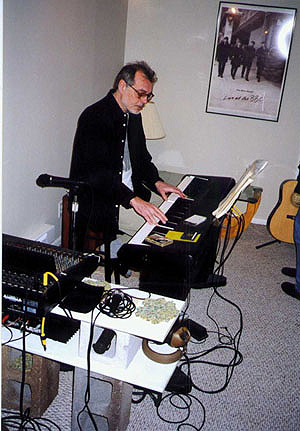 Jim
Pembroke: Wigwam proper, let’s say, it’s not active
or functioning at this time. A lot of the guys, Rekku included, they
have a thing called Wigwam Revisited now in Helsinki and they’re
a bunch of guys who’ve played in Wigwam, like Janne, from the
Light Ages times... Noponen on drums. You can see it on YouTube.
Look for Wigwam Revisited. It’s like former Wigwam guys just
jamming around on Wigwam songs and it’s really good. Måsse
(Groundstroem) played with them too. Måsse and Rekku play there,
and Mikko Rintanen. And Gutsi, Gustavson’s played in Wigwam Revisited.
I saw Janne, because I went to Finland for Otto’s funeral and
memorial jam, a year ago now. August of last year (2013). Over a year
ago now. And I saw Janne and I said, ‘hey Janne, I see you’re
keeping the flame of the Wigwam going good.’ He’s a Wigwam
mate and all that. But I decided already before that if I met Janne
I’d tell him ‘you guys are doing a really doing a good job
keeping the flame alive.’ And that’s what I said. I said,
‘I’m not staying that long, otherwise sure, I’d sit
in.’ All the Wigwam guys have played there as far as can see.
Pedro hasn’t and I think Mats (Hulden) has not. Well the last
Wigwam we had was Rekku, Måsse, Kepa, and Mats and me. Mats
and Kepa have not played in there. “Kepa” (Jari Kettunen)
was the drummer after Janne (Noponen). All this is old history now.
Jim
Pembroke: Wigwam proper, let’s say, it’s not active
or functioning at this time. A lot of the guys, Rekku included, they
have a thing called Wigwam Revisited now in Helsinki and they’re
a bunch of guys who’ve played in Wigwam, like Janne, from the
Light Ages times... Noponen on drums. You can see it on YouTube.
Look for Wigwam Revisited. It’s like former Wigwam guys just
jamming around on Wigwam songs and it’s really good. Måsse
(Groundstroem) played with them too. Måsse and Rekku play there,
and Mikko Rintanen. And Gutsi, Gustavson’s played in Wigwam Revisited.
I saw Janne, because I went to Finland for Otto’s funeral and
memorial jam, a year ago now. August of last year (2013). Over a year
ago now. And I saw Janne and I said, ‘hey Janne, I see you’re
keeping the flame of the Wigwam going good.’ He’s a Wigwam
mate and all that. But I decided already before that if I met Janne
I’d tell him ‘you guys are doing a really doing a good job
keeping the flame alive.’ And that’s what I said. I said,
‘I’m not staying that long, otherwise sure, I’d sit
in.’ All the Wigwam guys have played there as far as can see.
Pedro hasn’t and I think Mats (Hulden) has not. Well the last
Wigwam we had was Rekku, Måsse, Kepa, and Mats and me. Mats
and Kepa have not played in there. “Kepa” (Jari Kettunen)
was the drummer after Janne (Noponen). All this is old history now.
mwe3: How did If The Rain Comes come together on TUM
Records? I heard good things about the guy who runs it.
Jim Pembroke: Well I knew that Otto was doing a lot of digital
editing at his studio.. Cleaning up all these old tracks and making
them sound good. He was working with TUM Records and Petri Haussila.
They started out as a jazz for friends, no big take over the world
kind of thing. And also there was some American jazz stars who happened
to be visiting, they got them in the studio. He was making things
happen on a jazz level. TUM in English means, really new music. This
record with me... and have you heard of Dave Lindholm? Okay, Dave
and me... for some reason, we’re just the two guys that they’ve
recorded, that don’t have anything to do with jazz. And that
comes through Otto. He was the guy sitting next to Petri, suggesting
the next project. And eventually Dave’s name and my name came
up. And eventually, by way of Petri, somehow this miracle got arranged.
mwe3: Well TUM did a great job on the packaging and the sound...
just the way it looks, a fantastic job all around.
Jim Pembroke: That picture on the front was taken by Rick’s
(Rick Chafen) wife Kathie, just on a visit to Fort Osage here in Missouri,
near Kansas City. It was one of the photographs I sent to them as
possible covers... for the cover. And they liked that one of me looking
through... that’s from the old Fort Osage, here in Missouri.
An old Cavalry fort from 200 years ago. That’s the one they went
with. The whole package is cool and you have to remember that between
all of this happening, Otto dies... on top of everything else. That’s
a tough blow when that happens.
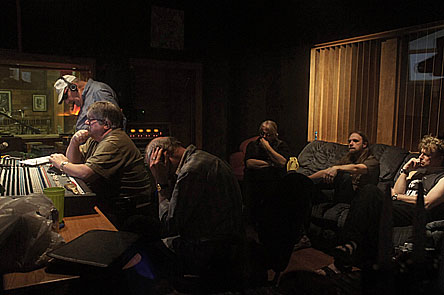 mwe3:
Do you think If The Rain Comes could have been better sounding
if Otto had lived to see it through to completion?
mwe3:
Do you think If The Rain Comes could have been better sounding
if Otto had lived to see it through to completion?
Jim Pembroke: Well like I said, Otto got into the mixing already
but after the accident, it was like, ‘what now?’ And in
the end, that added another half year, nearly a year after the whole
thing. After Otto died, eventually, it was Pedro and Orma who... Pedro
called and said they’ve got time, they're going to mix it with
Orma and Risto Hemmi, who is the number one guy at Finnvox, which
is like the Abbey Road of Finland, if you like. That’s where
we made all the early Blues Section and Wigwam stuff. Hot Thumbs...
In Finnvox. He was a junior kid, in those days. He still works
there and he’s the number one guy in Finland now. Those three
got together and said, ‘we’ll mix this.’ I think they
worked a couple of weeks. They did some overdubs. Orma and the other
guys put some ooo-wahs in there, especially on the “Doo-Wah”
track. That (track) was mainly so the drummer would have some solo
space. We wanted a drum solo and a bass solo. That was made for the
benefit, so that... just to get some kind of groove going, then the
drummer could take it away. I added in a couple of doo-wahs and couldn’t
think of what to call it, so in the end we said, ‘Let’s
call it “Doo-Wah” so we did.
mwe3: So what’s the plan? Is there an international release
in other countries? A lot of musicians are complaining that music
is being given away these days for nothing...
Jim Pembroke: Well, I read on the TUM Records’ site and
the Wigwam web site that, the international release is September 16th
or something. What international release means, I don’t know
because I’ve not heard of any deals with any record company outside
Finland, outside TUM. I know that Petri does have... he has offices
in New York as well. Petri’s a fan, he’s a jazz fan. He
loved Otto and everything that Otto got going and Otto’s suggestions
like ‘Let’s try an instrumental record with so and so person’,
and eventually my name came up. It was a process, like I said, that
took three long, drawn out years before it was actually behind the
cellophane package. With the package on the table, that took three
years before it was ready. And release international... I don’t
know what does that mean? You can order it by post or however they
do it. Lots of people just copy it off the radio or their computers.
People copy stuff and what can we do about it?
mwe3: So what do you think, will there be another record? Hopefully
we’ll all be alive and well.
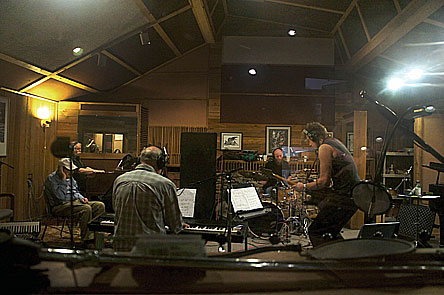 Jim
Pembroke: Well, I’ve lived a life based on the next record.
(lol) Now I go off to the next record and Petri’s assuming I’ll
make another record with him and the same group of guys. I’m
just starting the stages of that... because playing with these guys
was like a revelation. Fantastic guys, just about, one of the best
bands I’ve ever heard are these guys live in the studio. So good
that I want to do the next record with these guys. Petri knows that
if I do any other record that it’s these same guys. Where or
when, that’s under question mark. Sometime in the future. I’m
working on it.
Jim
Pembroke: Well, I’ve lived a life based on the next record.
(lol) Now I go off to the next record and Petri’s assuming I’ll
make another record with him and the same group of guys. I’m
just starting the stages of that... because playing with these guys
was like a revelation. Fantastic guys, just about, one of the best
bands I’ve ever heard are these guys live in the studio. So good
that I want to do the next record with these guys. Petri knows that
if I do any other record that it’s these same guys. Where or
when, that’s under question mark. Sometime in the future. I’m
working on it.
mwe3: But Otto won’t be there. He added a lot to the record,
those string arrangements on If The Rain Comes were just so
beautiful...
Jim Pembroke: That’s what he liked to do, around my songs
and for many other people... But for my songs it goes right back to
Blues Section y’know? Finding places for strings. So, I’d
always have a bunch of new songs and I’d say, ‘Hey Otto,
I can hear those Donner strings all over this,’ and he’d
laugh and say, ‘Yeah, yeah, yeah.... okay’ and he’d
always come up. Otto was a funny guy. He didn’t need to sit at
a piano or sit at a table with his head in his hands, composing. He
did it all in his head. And he’d just shuffle around, get coffee
or then just go to his studio. The guy liked a deadline. Like ‘The
studios are booked for the 15th, have you got the strings ready? Yeah
sure,' he'd always say... He may not have had anything ready but when
he had a deadline, that’s when his mind started clicking. ‘Now
I’m going to think about it’ sort of thing.
He worked in a kind of funny, subconscious way almost. He didn’t
need to play a piano, like I said. He did it all in his head. He was
one of those guys. He could sit down and write note paper out and
write down the notes that’s gonna come on the strings. Then he’d
bring them into the studio and put the notes in front of the violin
players and they’d all play. And they’d play the backing
track and wouldn’t you know it, it always worked. Without Otto,
now well... life must go on. Umm... I’d love to have this band
come and have the possibility of showing what they could do on the
stage. That’s what I’d like to do. I’ve managed to
do just about every place in Finland in forty years. You get to play
every place. But here in America... and all of those guys. If only
we could somehow swing it to get a tour, then these guys playing America
will surely wake some people up. It’s a fantastic live band,
even better than Wigwam. They’re different, even on similar instruments.
It’s kind of like, I wanted to avoid a new ‘ghost’
Wigwam record, so I tried to get different kind of guys in. And it
turned out to be these guys. It’s a fantastic band. But you know,
it takes a lot of luck and cash to set up a tour in America.
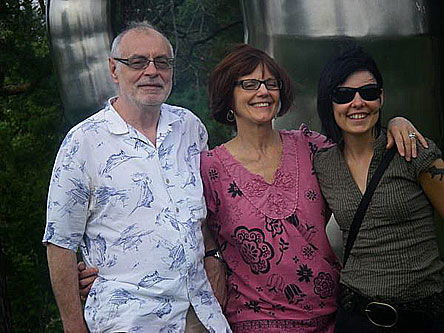 mwe3:
Any thoughts on getting older? I met you and Pekka back in that bar
in Helsinki 35 years ago and, I was 25 and you were like only 33.
mwe3:
Any thoughts on getting older? I met you and Pekka back in that bar
in Helsinki 35 years ago and, I was 25 and you were like only 33.
Jim Pembroke: Thoughts on getting older? There was a time when
I couldn't imagine singing "Nuclear Nightclub" at aged 40.
Where was I on my 40th birthday? At the Blues Emporium club in Kansas
City singing "Nuclear Nightclub" and all those other songs.
So, I guess as long as Dylan and Keith Richards are still out there
doing it, I'll just tag along. Too late to stop now or learn something
else. Anyway, music still fascinates and intrigues me as much as it
did when I picked up my first couple of guitar chords as a teenager.
Bar in Helsinki 35 years ago? I think that was in a club called Natsa,
actually. In the back room. It was Wig's home turf in those days.
Same club where Zappa was talking to Pekka that time.
mwe3: Because I specifically went to Finland to meet you and
Pekka. Without you and your music, who knows what might have happened
in Finland? You created the English singing rock scene in Helsinki,
some might say.
Jim Pembroke: Well you know I didn’t know what I was walking
into. I didn’t know there were all these teenage guitarists and
drummers who were going to be professional and who were exciting and
great musicians. I didn’t know I was going to meet them all and
make bands and songs with many of them. It all just sorta happened.
The talent was there and I kinda unknowingly stumbled into it all
with a song or two and my Carnaby Street clothes.
mwe3: When I interviewed him at Finlandia Hall in Helsinki
in August 1980, Pekka told me that before The Beatles, pop music was
shit, to use his words. Funny how, in my mind at least, Wigwam was
kind of the Beatles of Finland.
Jim Pembroke: Well, titles like "The Beatles of this or
that" are made up in offices of magazines or newspapers, PR companies,
not members of any bands I know. We were from a different galaxy than
The Beatles as a band. Oh, yeah, everybody loved The Beatles. Whoever
played in Wigwam was always a Beatles fan. I kind of like the Stones
as much as The Beatles. It wasn’t Beatles or Stones for me. It
was both... I liked them both.
Thanks to Jim Pembroke @ www.wigwam.stc.cx
and to TUM Records @ www.TumRecords.com
